When I started this blog, I knew that my mother’s uncles in Vienna had butcher shops, plural, and that one of them sold meat — kosher meat, my mother said — to Sigmund Freud’s wife. It wasn’t until I did a lot more research that I was able to put names to the butchers, however, and to learn just how extended the family meat connection was, and how far back it went.
The Kornmehl Meat Vendors
It turns out that my great grandfather Heinrich (Chaim) Kornmehl was a butcher, probably going back to his birth home of Tarnow, Poland. The tombstone of his wife, Henriette (Chaya) Kornmehl, calls her a Fleischhauersgattin—a butcher’s wife. (It was too late for her to protest, but I can’t help but wonder if she wouldn’t have preferred to be remembered for something else.) Heinrich and Henriette had eight children, five girls and three boys, Siegmund, Rudolph, and Martin, all of whom went into the meat business. Martin’s two sons, Hans and George, became butchers too.
The butcher shop that is best known is Siegmund’s because it shared an address with Sigmund Freud, 19 Berggasse, for some 44 years. Edmund Engelman, who photographed Freud’s home and offices two weeks before Freud left Vienna for London in 1938, took pictures of the ground floor storefronts too. When the butcher shop was incorporated into the Freud Museum as an art gallery, in 2002, the first exhibit included a blow up of Engelman’s photograph of the shop (for a discussion of the exhibition, and my wish for future shows, see Art vs. History: The Butcher Shop in Freud’s Building):
The Freud Museum calls the business a kosher butcher shop in the show catalog and I naturally took them at their word. That turns out not to be accurate, as this ad in the local Jewish paper indicates:
The shop that sold “Koscherfleisch” was down the block from Freud’s house, on #15 Berggasse, not #19. That doesn’t undermine my mother’s assertion that Frau Freud bought kosher meat, however. Two stores down would not be far to go for the former Martha Bernays, the granddaughter of the chief rabbi of Hamburg.
A Less Famous — But Better Photographed — Vienna Shop
Edmund Engelman was a great photographer, but he was not very interested in anyone but Freud. The best picture of a Viennese family butcher shop is that of Rudolf Kornmehl’s decidedly nonkosher meat emporium, sent to me by his late granddaughter, Gigi Michaels:
I wrote about the shop and the shop owners in Rudolph Kornmehl: 3 Butcher Shops & the End of a Jewish Era in Vienna.
Several other members of the extended family worked in the family butcher shops too.
Although David Schmerling, the husband of one of the five Kornmehl sisters, Mitzi, was a jeweler, Rita Saffer recalls that, “My grandmother [Mitzi] worked in the family butcher, apparently because they needed the money. She was also able to bring home meat which they gladly accepted.”
A more distant relative, Jeno Desser, describes his mother’s working in a family butcher shop as being indicative of the family having fallen on hard times.
Which butcher shops did these relatives work in? They didn’t specify. I suspect in Mitzi’s case it was the one at 19 Berggasse, because Siegmund and his wife ended up adopting Mitzi’s daughter, Stella — but that’s a story for another day.
The Buffalo Butcher
Now we move from the realm of the business of a tight-knight family to coincidence — I think.
In this blog’s first guest post, Jill Leibman Kornmehl tells the story of her father-in-law, Nathan, titled: The Last of the Kornmehl Butchers (Maybe).
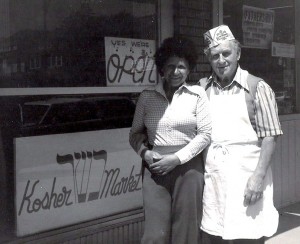
Nathan, who is 96, says he went into the business because his Hasidic wife, Frances, wanted him to find an occupation that didn’t involve working on the sabbath. His three sons, including Jill’s husband, Bernie, worked in the shop when they were young. “I was satisfied, I always made a living,” Nathan said. “When I was in the war, I saw children die from hunger and I was happy my kids always ate well. But I never wanted them to be butchers.” He got his wish: Their professions are lawyer, doctor, dentist, teacher and talent agent.
In the Meantime, in England
Another kosher butcher, in Leeds, England, felt differently about the family trade. The Selwyns wanted their son, Sydney, to take over the business. But Sydney Selwyn went on to become an acclaimed physician and scientist.
Why is this relevant? Because Sydney’s wife, Flora Selwyn, is the niece of David Schmerling, mentioned earlier. He is the jeweler whose wife, Mitzi Kornmehl Schmerling, worked in one of the Kornmehl butcher shops.
Flora, one of the extended Schmerling-Kornmehl family I recently connected with, provided me with the following photo — which I requested when I learned there was yet another butcher in the family. I asked for a date for the picture, and she responded:
My brother-in-law says he has the same photo of the butcher shop, but has no idea when it was taken. He said it was the first shop they had, and since his mother looks quite young it must have been probably 79 years ago… My parents-in-law were both born in Leeds of refugees from the Pale of Settlement in the 19th century.
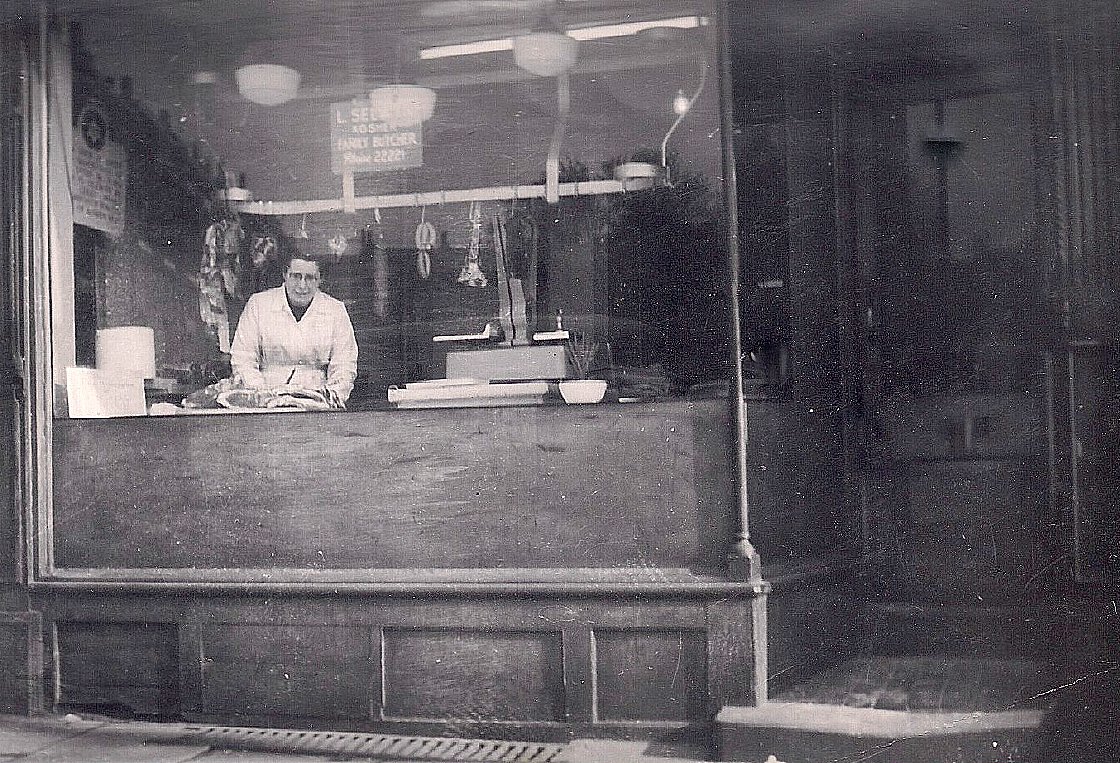
Flora recalls that both her husband and his brother helped with deliveries when they were young, but during the marriage, “We never visited the shop. Mother- & father-in-law went out very early in the morning. We usually had babies in tow when we visited, so stayed away.”
I recently bought the book Contested Rituals: Circumcision, Kosher Butchering and Jewish Political Life in Germany, 1843-1933, by Robin Judd. I know that many of Judd’s conclusions apply to life in Austria too, and that antisemitism is an important part of the discussion. I’ll write about that — eventually. In the meantime, I leave you with some happier vignettes of the family business.

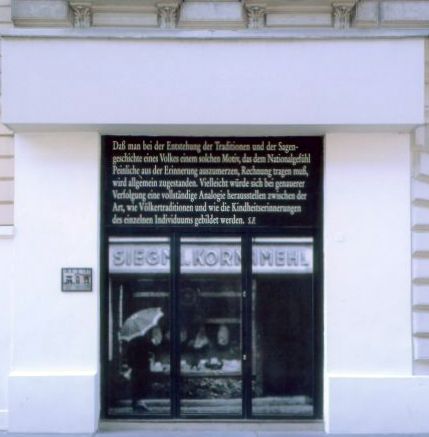
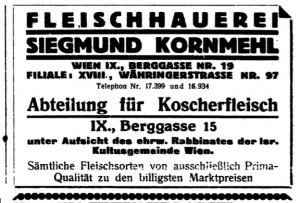
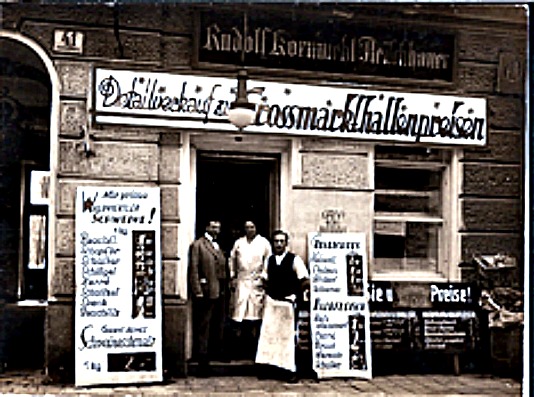
I know I have relatives who were in the butcher shop business and never thought about how it might have meant the difference between starving and having enough to eat – now that the next generation all became doctors, as your story makes clear – who’s left that wants to run a kosher meat business?
These photos are particularly beautiful and evocative.
There are very few individual kosher butcher businesses left, mostly corporate run places — unfortunately. But I guess that’s true of most mom ‘n’ pop groceries vs supermarkets.
Yes, I agree, the photos are wonderful.
Nathan would be delighted to know that he entered a family profession. Little did he know that his fellow family members were also butchers! It is interesting that there are so many different ways that the family members from different branches share connections, professions and places of residence with each other.
I’m glad to hear it. Even more interesting to me is the fact few family members had an inkling that the other family members existed — much less shared professions!
Fascinating article. I found this while looking for a meat saleman in Buffalo about 1939 called something like Jack Bell/Buell and also Joseph Lurie. Does anyone know of either man. Thanks
Hi
I’m trying to trace info on a butcher Heinrich Ehrlich that worked in Vienna in 1938 for Ludwig Geiger based at 21 wehrgasse.